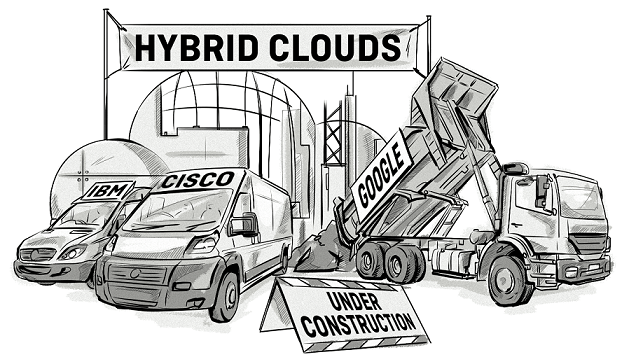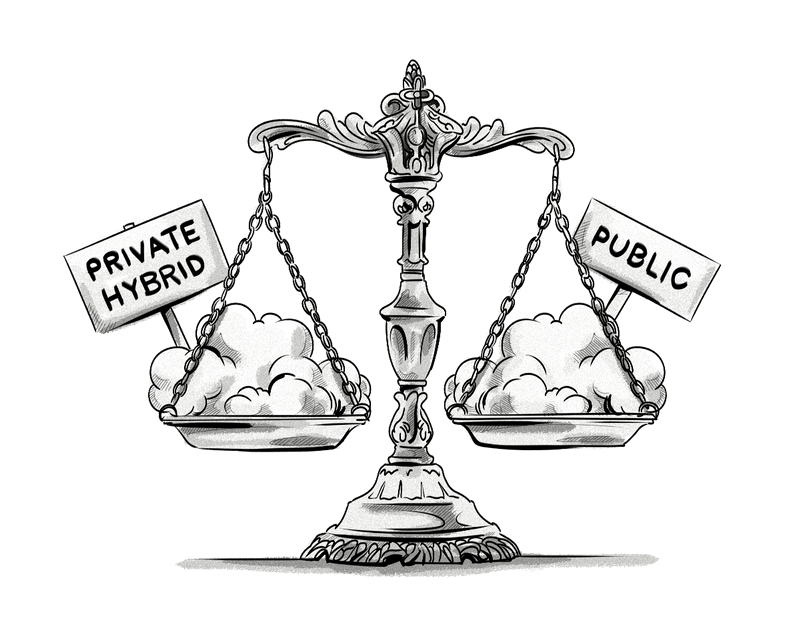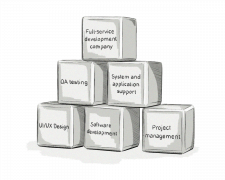Microsoft, IBM, Cisco, Google — some of the biggest names in computing are all taking a step in the same direction.
What’s the scoop? Hybrid cloud computing.
The last year and a half has seen the aforementioned giants scrambling to bring hybrid-cloud startups into the fold. Microsoft forked over a reported $200 million for Israeli security startup Aorato, Cisco inked a deal to acquire CliQr to boost its hybrid-cloud management possibilities, and IBM made a bold move to solidify its cloud presence through deeper cooperation with Apple, VMWare, and GitHub (among others). Not to be left behind, Google took the step of integrating its Cloud Platform with Splunk and BMC and Tenable for better hybrid-cloud operations.

A Range of Advantages and Concerns
This flurry of activity on the hybrid-cloud front comes on the heels of a wider move towards cloud-solution adoption among enterprises, which has been tempered as of late by growing security concerns.
Faced with the undeniable advantages of cloud-based applications, as well as the need to protect their data and that of their customers, companies must wade through a wide range of factors when choosing how to approach the future of their IT systems, such as:
Public Cloud Solutions
Examples of enterprise-level public clouds include: Windows Azure Services, Google’s AppEngine, and IBM’s Blue Cloud.
PROS:
- Cost-effective: Clients pay only per usage and do not have to invest up front in hardware. Monthly or yearly fees are easy to budget for.
- Easily scalable: Growing or downsizing are made easier by the pay-per-usage model and add-ons can happen overnight without lengthy installation.
CONS:
- Reduced security: Data stored or processed on public cloud servers can potentially be compromised by hacks and may make it difficult to comply with security regulations in data-sensitive industries.
- Flexibility concerns: Because public clouds are built for a whole range of clients, they often lack customization features needed by enterprises, making them less flexible. Getting locked into one vendor may also cause some concerns if those solutions prove insufficient for a client’s changing needs.
Private Cloud Solutions
PROS:
- Greater control and security: By hosting applications and storage on their own infrastructure, enterprises can guarantee that no data will be lost or that their services will be disrupted.
- Internal scalability: While not as simple to scale as public clouds, private clouds still allow companies to add or remove users internally, providing transformation economics for internal departments and/or clients.
CONS:
- Cost: Developing and implementing a private cloud is quite expensive, especially for large companies with a wide range of applications that must be migrated to the cloud.
- Maintenance: Besides requiring development and setup, private clouds also require more IT support for updates and scaling.
When total flexibility collides with total control, and neither public clouds nor private clouds make a good fit, hybrid solutions become more attractive, hence the current race in this direction.
On the one hand, systems and data can be hosted on internal infrastructure, but on a reduced scale. When need requires, certain actions or processes can be pushed to a public cloud for greater productivity.
The smooth and automated transition to public cloud at peak times (a.k.a. cloud-bursting) is one main consideration when enterprises look at adopting a hybrid-cloud approach. Any hiccups in transitioning back and forth from publicly to privately hosted resources can create major problems.

To address this point, Velostrata, another startup with Israeli roots, has developed a solution that helps separate storage from computing resources for easy transition to a public cloud using a virtual machine. With its plugin to a VMWare vCenter admin console and planned integration with Microsoft Azure, it’s not hard to envision this solution becoming more widely adopted.
Of course, security remains the major concern for most cloud customers, and when it comes to hybrid clouds, there is no exception. This may lead some enterprises to consider combining a self-hosted cloud for essential data storage with a virtual public cloud — i.e. a walled-off publicly hosted environment to which they can move in times of need.
The cumbersomeness of maintaining multiple servers and integrating them with a large number of applications, as well as deploying updates and distributing data, are also important points to consider.
Few enterprises have a large enough IT department to tackle this task on their own, which is what giants like IBM, Microsoft, and Google count on to push their “all-in-one” solutions.
While they may have more and more to offer as things continue to develop, it will be up to enterprises themselves to decide what is the best fit for them. If current concerns about data privacy continue to gain ground, there may be even more of a need for custom private and hybrid cloud solutions.
In that case, the entire hybrid shopping spree could turn out to be a waste.
Questions, queries, comments?
Join the conversation about this post on Facebook, Twitter, and LinkedIn.







